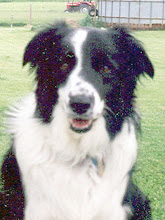Katahdin sheep can breed year-round. Because we don't want lambs year-round, the ram is only allowed to be with the ewes for a month in the fall.
So, what do we do with the ram for other 11 months? Being a flock animal, he's nervous and stressed if left alone. Put him with ewes and he breeds. Put him with rams, and he fights. The wether as his companion is the solution.
But here's the problem with wethers. If their only jobs are to eat and to keep the ram company, they get quite large. This fall, our 4-year-old wether, Bon-Bon, was as wide as he was tall. I was unsure how long he'd stay sound--and I certainly wasn't looking forward to trying to trim his hooves. It was time to send him to the butcher and get a replacement.
Bon-Bon (on left) with Apollo, the ram on the right.
In this photo, Bon-Bon is not quite a year old.
In this photo, Bon-Bon is not quite a year old.
Hoping the new wether would stay on the small side, I selected our smallest wether to keep.
He's the one in the photo with the hay in his mouth. In the past month, he's been grazing with the unbred ewes and eating like it's his only job. Yesterday, though, he was introduced to his other job: keeping the ram company.
Because he isn't used to being in a flock of two, nor familiar with the ram pasture, I put the wether, ram and two bred ewes in the ram pasture. Next weekend, I'll remove the ewes.
In the meantime, I'll need to come up with a name for him. The ram is Titan.
Fun fact: This past week a friend asked if I knew of the origin of bellwether. It refers to the old practice of putting a bell around the neck of the wether leading the flock.
Meanwhile on the farm: We've already had two mornings this month when I've stepped outside onto snow. Our 15-acre pasture though still has plenty of grass for grazing. Unfortunately for me it's not near the barn. Fortunately for the Border collies, it's a trek from the barn and they get to help move sheep daily.
















